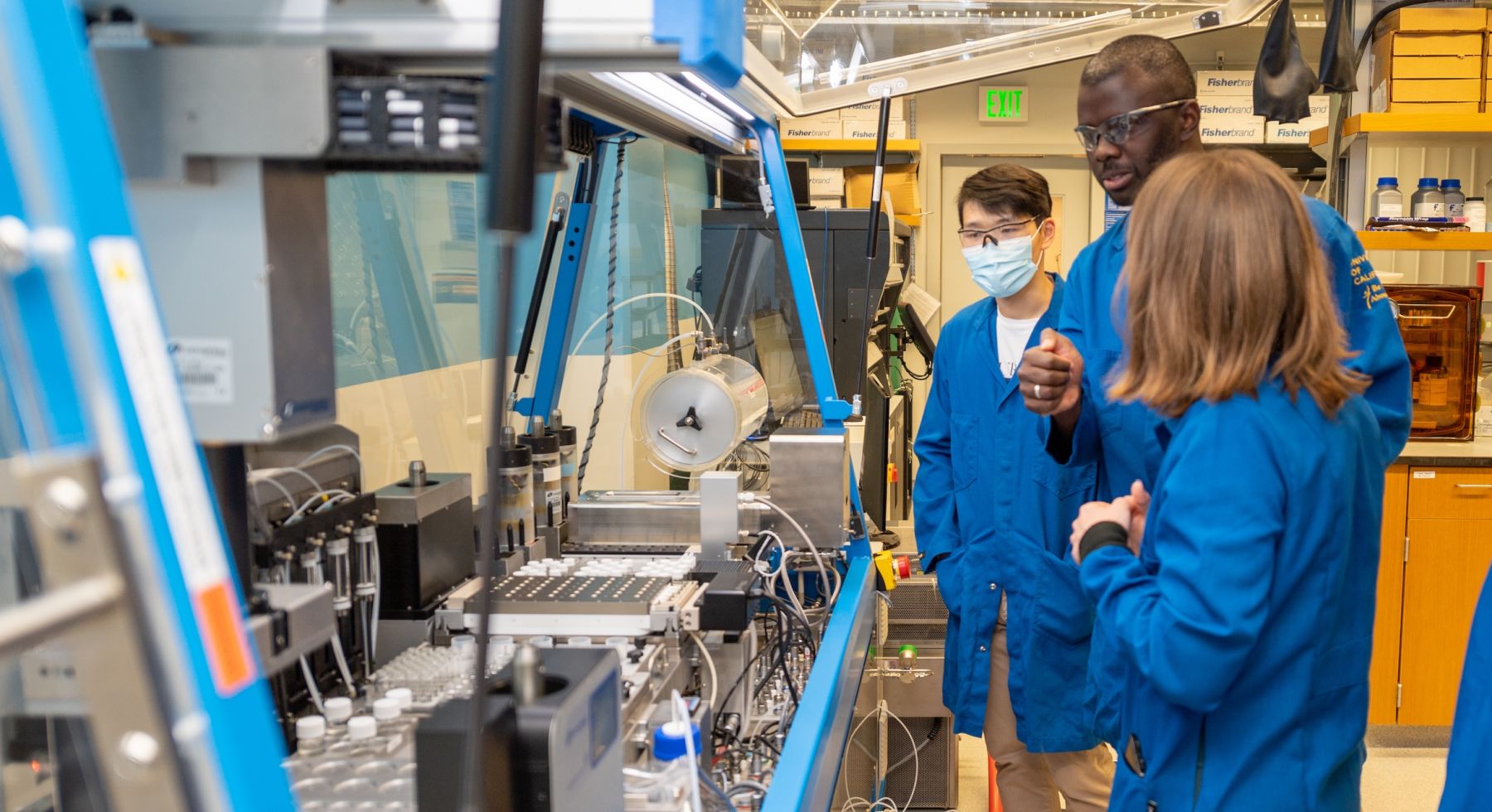BioPACIFIC MIP Catalyzing Automated Polymer Synthesis (CAPS) Fellowships
BioPACIFIC MIP is excited to launch a cohort of dedicated projects seeking to transition polymer synthesis from the bench to the Chemspeed robotic platform, including leveraging or developing automated workflows and AI tools. BioPACIFIC MIP's Catalyzing Automated Polymer Synthesis (CAPS) Fellowships supplement a project proposal with up to $10k to support stays of up to one month at UC Santa Barbara for one or more project researchers, as well as travel to California and between UCSB and UCLA as may be required by the proposed project. Fellowship can be also used to cover specialized materials and supplies for use in the BioPACIFIC MIP facilities and access to shared facilities at UCSB and UCLA outside of the MIP.
The BioPACIFIC MIP CAPS Fellowships are made possible through a generous donation to BioPACIFIC MIP and UC Santa Barbara by the Hawker Family Fund and with matching support by Chemspeed Technologies.
CAPS Fellowships
Connect with Us
Let us know about your project idea or if you have questions about becoming a user.
Additional resources
Active Projects
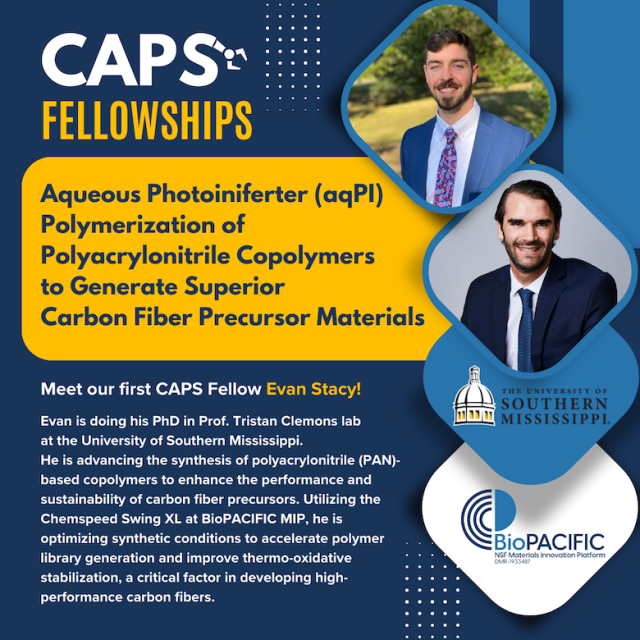
Automated Synthesis of Advanced Carbon Fiber Precursors
This project, led by CAPS Fellow Evan Stacy, a graduate student in the lab of Prof. Tristan Clemons at The University of Southern Mississippi, is advancing sustainable, high-performance carbon fiber precursors through innovative polymer chemistry. Using BioPACIFIC MIP’s Chemspeed robotic platform, the team is accelerating the development of aqueous photoiniferter polymerization techniques for polyacrylonitrile copolymers.
The project aims to:
- Optimize synthesis conditions by rapidly screening hundreds of variables - including comonomer selection, ratios, and polymerization methods - to enhance thermo-oxidative stability.
- Control monomer distribution through comparison of one-pot and semi-batch polymerization approaches, with Chemspeed ensuring precision and reproducibility.
- Accelerate polymer library development, reducing synthesis time and enabling faster structure–property analysis for next-generation carbon fiber materials.
This high-throughput, data-driven approach supports the discovery of sustainable materials with improved performance characteristics.
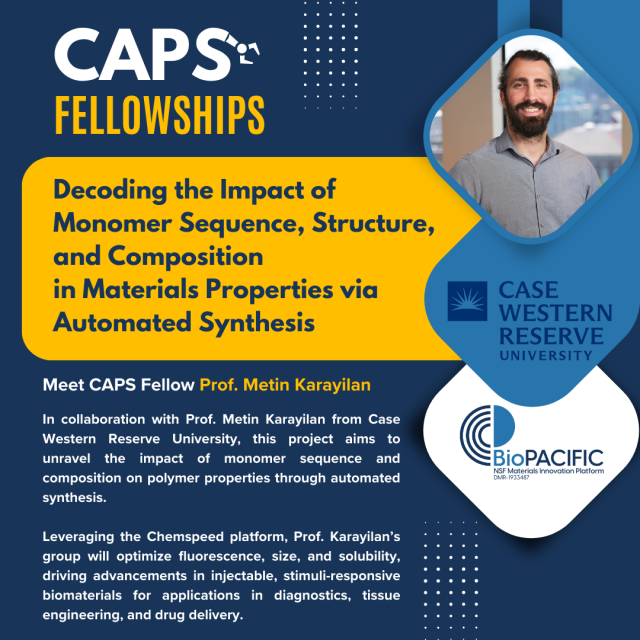
High-Throughput Design of Fluorescent Biomaterials
This project, led by Prof. Metin Karayilan, a CAPS Fellow from Case Western Reserve University, focuses on the automated synthesis and characterization of polymers with defined monomer sequences and fluorescein incorporation for biomedical applications. By integrating experimental work with computational modeling, the research aims to advance the design of functional biomaterials.
Utilizing BioPACIFIC MIP’s Chemspeed robotic platform, the project will:
- Automate high-throughput polymer synthesis to precisely control monomer sequence and composition.
- Optimize diverse polymer architectures - including diblock, random, bottlebrush, and hyperbranched structures - for targeted properties such as fluorescence intensity, hydrodynamic size, and solubility.
- Refine polymer formulations to improve performance in biomedical contexts, including injectability, cell viability, and responsiveness to stimuli.
By bridging predictive modeling with experimental validation, this project will deepen the understanding of sequence–property relationships and accelerate the development of next-generation biomaterials.
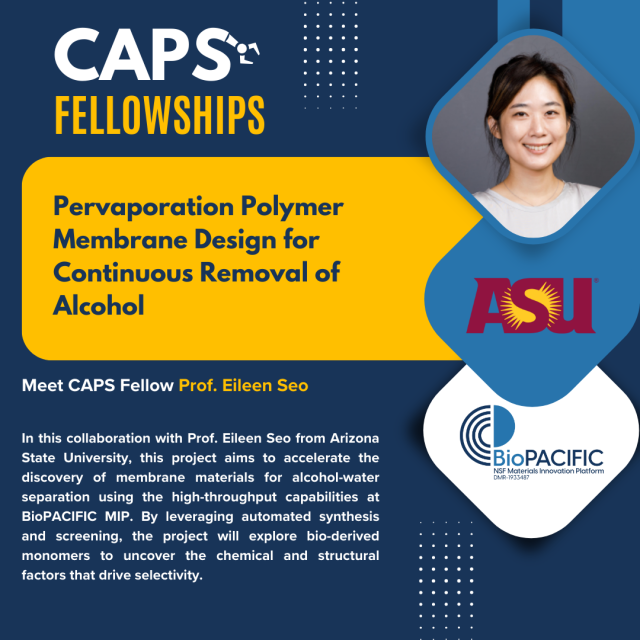
High-Throughput Discovery of Sustainable Membranes for Biofuel Recovery
This project, led by CAPS Fellow Prof. S. Eileen Seo, from Arizona State University, is accelerating the discovery of next-generation membrane materials for efficient alcohol–water separation—a critical step in sustainable biofuel production. In collaboration with BioPACIFIC MIP, the research addresses the limitations of conventional PDMS membranes, which tend to preferentially absorb water.
Leveraging BioPACIFIC MIP’s automated synthesis platform, the project will:
- Rapidly screen bio-derived monomers to identify promising candidates for membrane development.
- Investigate structure–property relationships to understand how chemical composition and architecture influence alcohol–water selectivity.
- Advance green separation technologies through high-throughput synthesis and testing workflows.
Membrane fabrication at UC Santa Barbara paired with performance evaluation at Arizona State University highlights the power of cross-institutional collaboration enabled by the CAPS Fellowship program, accelerating impactful materials discovery.
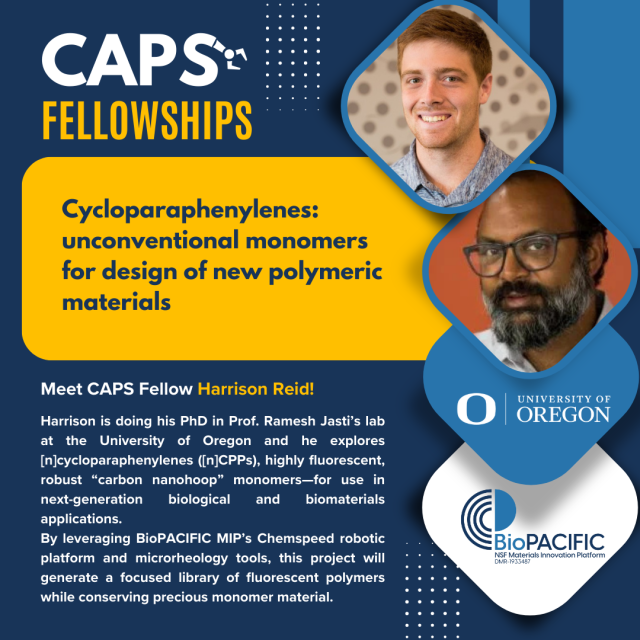
Expanding the Frontiers of Fluorescent Nanohoop Polymers
This project, led by Harrison Reid and Prof. Ramesh Jasti from the University of Oregon, is focused on building a diverse library of polymers incorporating [n]cycloparaphenylenes ([n]CPPs) - unique, highly fluorescent “carbon nanohoop” monomers with exciting potential for biomedical applications.
Utilizing BioPACIFIC MIP’s Chemspeed robotic platform and microrheology tools, the project will:
- Conserve rare [n]CPP monomers through precise, automated polymer synthesis.
- Construct a structurally diverse polymer library to explore a broad range of material properties.
- Characterize viscoelastic behavior to assess suitability for biomedical use.
By enabling access to advanced infrastructure and expertise, the CAPS Fellowship is supporting this innovative effort to explore a novel class of functional materials.
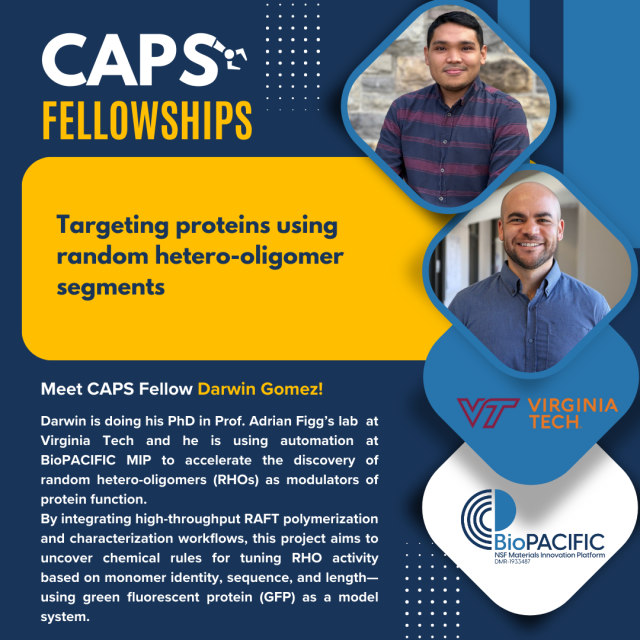
Sequence-Defined Oligomers for Protein Modulation
This project, led by Darwin C. Gomez, a Chemistry PhD student at Virginia Tech and CAPS Fellow under the mentorship of Prof. Adrian Figg, is focused on designing and synthesizing random hetero-oligomers (RHOs) to interact selectively with protein surfaces—laying the groundwork for next-generation bioactive materials.
Using BioPACIFIC MIP’s Chemspeed Chemical Synthesis Platform and Living Biofoundry, the project will:
- Investigate how monomer identity and sequence influence the binding and modulation of protein function.
- Utilize GFP as a model protein system to evaluate RHO activity and effectiveness.
- Generate comprehensive datasets that will support future AI-guided drug discovery efforts.
By enabling rapid synthesis and high-throughput screening, this project is advancing the development of functional oligomers and paves the way for a new class of bioactive polymeric materials.
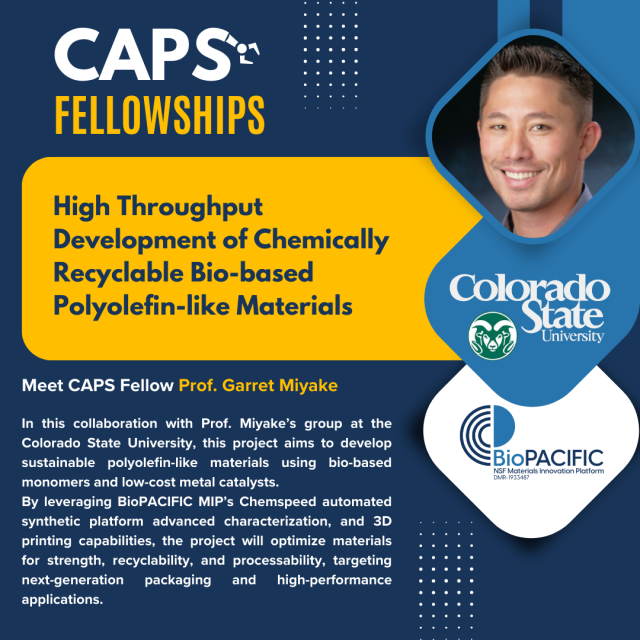
High-Throughput Discovery of Recyclable Bio-Based Polyolefin Alternatives
This project, led by CAPS Fellow Prof. Garret Miyake from Colorado State University, is pioneering the development of sustainable, chemically recyclable polymers as bio-based alternatives to traditional polyolefins. By integrating high-throughput synthesis and testing, the research aims to address pressing environmental challenges in materials design.
With access to BioPACIFIC MIP’s advanced automation and characterization platforms, the project will:
- Synthesize and analyze novel polymer architectures tailored for recyclability and performance.
- Evaluate key material properties, including mechanical strength and recyclability, for use in packaging and advanced applications.
- Rapidly explore chemical space through automated workflows to accelerate materials discovery.
Supported by the CAPS Fellowship, this work exemplifies how collaborative, technology-enabled research can drive innovation in sustainable materials science.
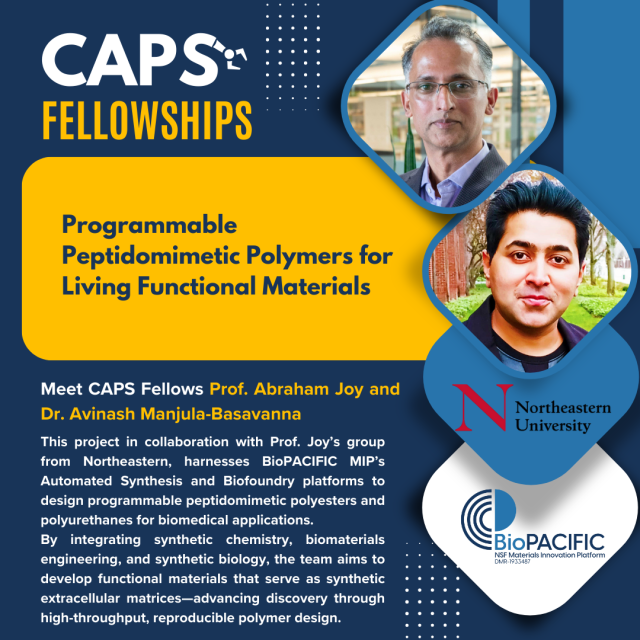
Programmable Peptidomimetic Polymers for Biofunctional Materials
This project, led by CAPS Fellows Prof. Abraham Joy and Dr. Avinash Manjula-Basavanna from Northeastern University, is developing programmable peptidomimetic polymers for use in synthetic extracellular matrices. By combining synthetic biology with advanced polymer chemistry, the team is designing materials that support regenerative medicine and cell culture applications.
Utilizing BioPACIFIC MIP’s Chemspeed Automated Synthesis Platform and Thermo Fisher Scientific Living Biofoundry, the project will:
- Accelerate the design and synthesis of polyesters and polyurethanes with tunable mechanical and biochemical properties.
- Integrate synthetic biology with materials engineering to create responsive and functional biomaterials.
- Advance biomedical solutions through the development of next-generation materials for tissue engineering and therapeutic platforms.
Through this interdisciplinary effort, the CAPS Fellowship is enabling transformative research at the intersection of biology and materials science.
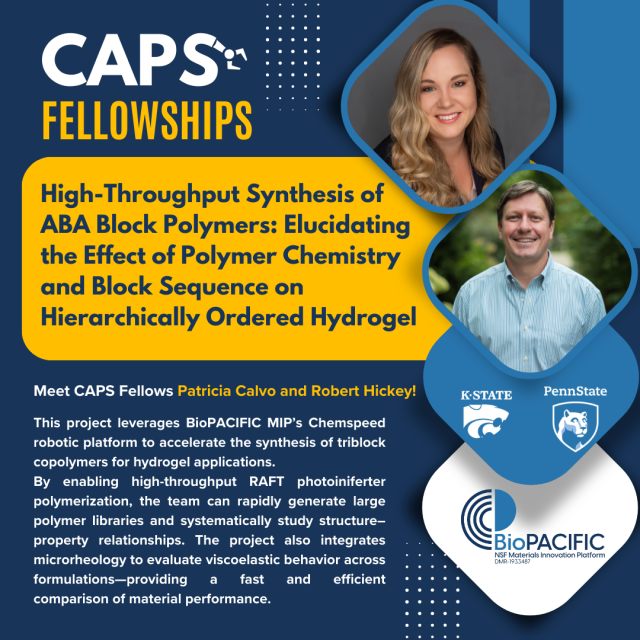
High-Throughput Discovery of Hydrogel-Forming Triblock Copolymers
This collaborative project, led by Prof. Patricia Calvo (Kansas State University) and Prof. Robert J. Hickey (Penn State University) through the CAPS Fellowship, is accelerating the development of triblock copolymers designed to form hydrogels with tailored properties.
Using BioPACIFIC MIP’s automated synthesis and microrheology capabilities, the project will:
- Rapidly generate and screen hundreds of triblock copolymers via RAFT photoiniferter polymerization.
- Evaluate hydrogel formation under a variety of process conditions.
- Characterize viscoelastic behavior using microrheology to guide material design.
Through CAPS, students gain hands-on experience with cutting-edge tools, while contributing to fundamental advances in soft matter and polymer chemistry.
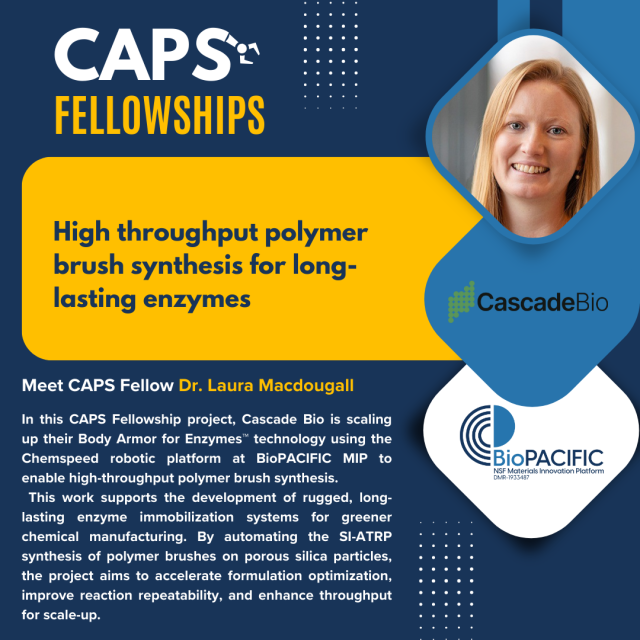
Automated Polymer Brush Synthesis for Enzyme Stabilization
This project, led by Cascade Bio through the CAPS program, is advancing the company’s Body Armor for Enzymes™ technology by leveraging BioPACIFIC MIP’s Chemspeed robotic platform to scale surface-initiated atom transfer radical polymerization (SI-ATRP) for enzyme stabilization. The goal is to enhance the durability and performance of biocatalysts for green chemical manufacturing.
With support from BioPACIFIC MIP, the project will:
- Automate high-throughput synthesis of polymer brush coatings tailored for enzyme immobilization.
- Develop robust, repeatable SI-ATRP workflows to ensure consistent performance at scale.
- Accelerate the transition from design to commercialization, supporting sustainable industrial processes.
This collaboration strengthens Cascade Bio’s commercialization efforts while contributing valuable methodology and data to the broader materials and biocatalysis communities.
Watch: Automated Synthesis Platform for Biomaterials
As part of Chemspeed's Webinar Series: Javier Read de Alaniz, co-director of BioPACIFIC MIP and professor of Chemistry & Biochemistry at UC Santa Barbara, presents on "An Automated Synthesis Platform for the Synthesis of Non-Fossil Based Biomaterials." Dr. Read de Alaniz discusses the unique capabilities of BioPACIFIC MIP and highlights how users can access state-of-the-art tools, such as the Chemspeed ISYNTH BIOMAT, to automate materials synthesis and characterization processes.
